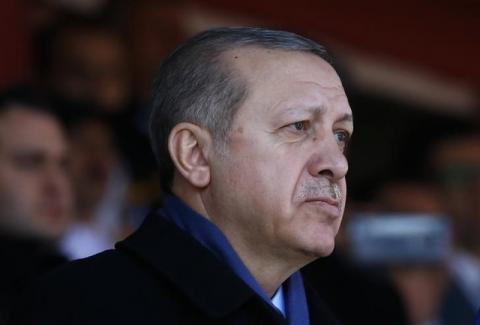Advertisement
Erdogan warns Europeans 'will not walk safely' if attitude persists, as row carries on
ANKARA (Reuters) - President Tayyip Erdogan said on Wednesday that Europeans would not be able to walk safely on the streets if they kept up their current attitude toward Turkey, his latest salvo in a row over campaigning by Turkish politicians in Europe.
Turkey has been embroiled in a dispute with Germany and the Netherlands over campaign appearances by Turkish officials seeking to drum up support for an April 16 referendum that could boost Erdogan's powers.
Ankara has accused its European allies of using "Nazi methods" by banning Turkish ministers from addressing rallies in Europe over security concerns. The comments have led to a sharp deterioration in ties with the European Union, which Turkey still aspires to join.
"Turkey is not a country you can pull and push around, not a country whose citizens you can drag on the ground," Erdogan said at an event for Turkish journalists in Ankara, in comments broadcast live on national television.
"If Europe continues this way, no European in any part of the world can walk safely on the streets. Europe will be damaged by this. We, as Turkey, call on Europe to respect human rights and democracy," he said.
Germany's Frank-Walter Steinmeier used his first speech as president on Wednesday to warn Erdogan that he risked destroying everything his country had achieved in recent years, and that he risked damaging diplomatic ties.
"The way we look (at Turkey) is characterized by worry, that everything that has been built up over years and decades is collapsing," Steinmeier said in his inaugural speech in the largely ceremonial role.
He called for an end to the "unspeakable Nazi comparisons."
Turkish Deputy Prime Minister Numan Kurtulmus said earlier that although Turkish government officials were still taking part in events for expatriate Turks across Europe, they were not campaigning for the referendum.
The Union of European Turkish Democrats, which organizes events in Europe, said on Tuesday that Turkish leaders would no longer hold campaign rallies in Germany after an ally of Chancellor Angela Merkel said they were not welcome.
Germany, home to some 1.4 million Turks eligible to vote in the referendum, has been angered by the Nazi comparisons and Merkel has demanded that Ankara halt the rhetoric. Erdogan, however, has repeated the message in speech after speech.
The Netherlands, also home to a large ethnic Turkish diaspora, has been embroiled in a similar row with Turkey.
Kurtulmus, who is also the Turkish government's chief spokesman, repeated the rhetoric on Wednesday, saying the "footsteps of neo-Nazism and extreme racism" could be heard in Europe.
Another deputy prime minister, Veysi Kaynak, meanwhile criticized Norway for granting asylum to Turkish military officers suspected of links to the religious network accused by Ankara of orchestrating last July's coup attempt.
"This, unfortunately, in my opinion, is the first sign that Europe, which suffered from civil wars that cost the lives of innocent people for hundreds of years, ... is turning into that Dark Age again," Kaynak was quoted by the state-run Anadolu news agency as saying.
The Turkish foreign ministry's spokesman said later on Wednesday that the ministry had summoned the Norwegian ambassador to Ankara to express Turkey's concerns over Norway's decision to grant asylum to the individuals.
Since the failed coup, which Ankara says was orchestrated by U.S.-based cleric Fetullah Gulen, some 40,000 people have been arrested in Turkey and more than 100,000 sacked or suspended from the military, civil service and private sector, while others have sought asylum abroad.
The foreign ministry's spokesman said Turkey would continue to pursue the matter.
(Additional reporting by Madeline Chambers in Berlin; Editing by Julia Glover and Toby Chopra)



















Add new comment